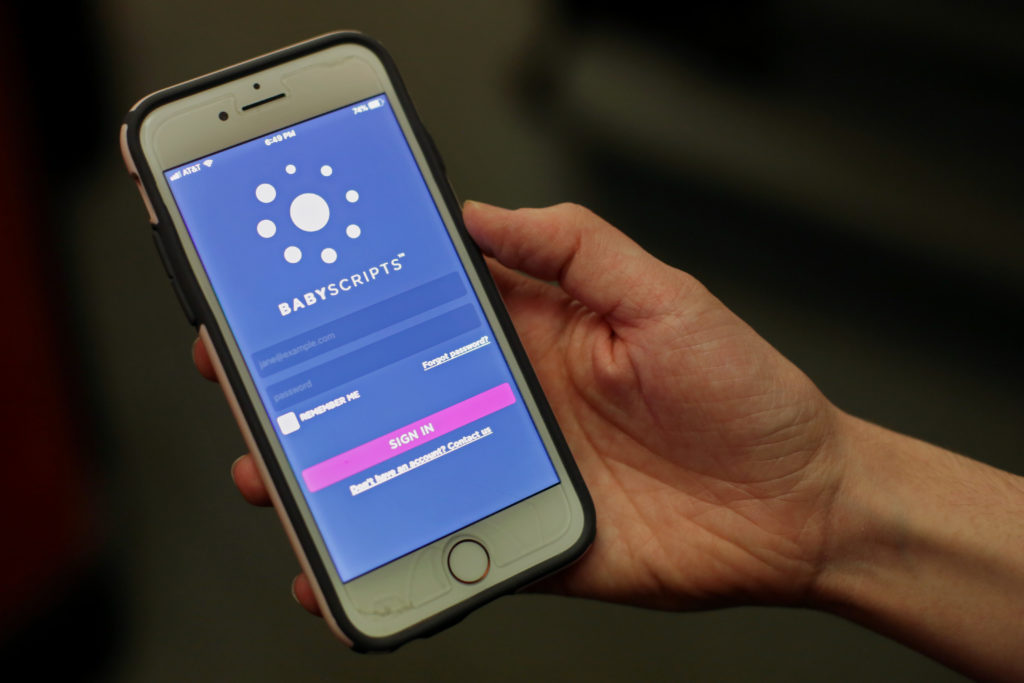GW’s largest medical entity is providing its patients with a mobile app to improve maternal health care.
The Medical Faculty Associates announced earlier this month that the group will partner with Babyscripts – a company that specializes in technology to assist patients during pregnancy – to use a mobile application in all of the medical group’s obstetrician-gynecologist locations. Officials said the app will help physicians monitor patients’ pregnancies through technology that is more accessible and affordable than making an appointment.
Babyscripts allows physicians to load medical resources, like statistics and informational handouts about pregnancy, to an app for their patients, according to the company’s website. The app also allows physicians to track their patients’ weight gain and glucose levels during pregnancy.
Patients can sign up for the app if their health care provider partners with Babyscripts, according to the website.
MFA officials first piloted a partnership with Babyscripts four years ago at the Bethesda OB-GYN location, but the collaboration was institutionalized earlier this month and is now available at all locations. Babyscripts partners with at least eight other medical entities, like MedStar Health and Advent Health, according to the company’s website.
Nancy Gaba, the chair of the department of obstetrics and gynecology, said GW was at the “forefront” of the introduction of Babyscripts technology, which she said has improved the accessibility of prenatal care.
“We are excited to expand this partnership at all of our locations in our ongoing efforts to make modern comprehensive pregnancy care available to all women in the D.C. metro region,” Gaba said in an email.
MFA spokeswoman Barbara Porter said the MFA was one of the first health care provider groups in the United States to approach pregnancy care through the “new lens” of technology. She said the app has helped the MFA address “the issues of gaps in prenatal care.”
Porter said Babyscripts targeted the MFA as a partner because the company is committed to addressing health care inequity in the District. She said the MFA is also the largest academic physicians practice in the D.C. area and has historically “embraced” technological solutions to health care.
Porter said the partnership will improve prenatal health care outcomes for women in D.C., where infant mortality rates and pregnancy-related complications are higher than national averages.
Porter said Babyscripts addresses three “critical realities” of prenatal care – the lack of education, the lack of access to care and failure to identify risk during pregnancy. She said educational materials are loaded onto the app for “easy access,” and using the app can “greatly reduce the burden” of health care costs that are associated with pregnancy.
“The app allows digital monitoring of the pregnancy journey, in most cases making care available from the comfort of a patient’s home,” she said.
Sarah Nicholson, the senior vice president of business development for Babyscripts, said that during the early stages of the partnership, the founders of the company met with Neal Sikka, an associate professor of emergency medicine, who introduced the founders to members of the OB-GYN department.
Nicholson said the two groups agreed that the use of a mobile device could be used to “rethink care and improve outcomes,” and they built the first version of Babyscripts.
“Without the belief and trust of the physicians and the entire staff, it would be too difficult to transform healthcare for the better,” Nicholson said in an email. “The physicians at GW MFA have made us a better company and deeply partnered with us to make sure that our tech-enabled model for managing pregnancy worked and fit the lives of both the clinical staff and patients.”
Nicholson said Babyscripts will now be available to all of the MFA’s pregnant patients, totaling roughly 3,200 people each year.
“All patients, regardless of their socioeconomic status, will have access to remote monitoring to detect problems faster and deliver safer mothers and babies in the District,” she said. “This is a first-of-its-kind expansion.”




